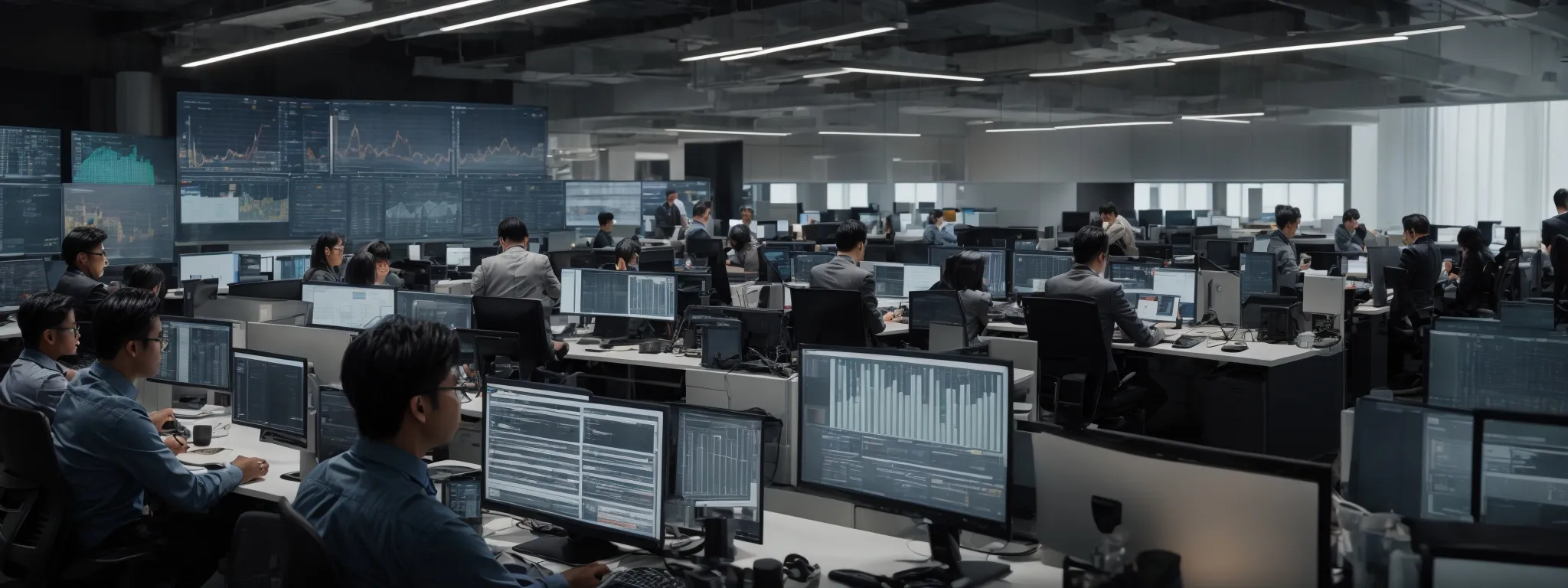Google’s New Search Algorithm: Unveiled
Inside Look at Google’s Latest Search Algorithm Update The search landscape is in constant flux, responding to the evolving ways users engage with the web. With the […]
Inside Look at Google’s Latest Search Algorithm Update
The search landscape is in constant flux, responding to the evolving ways users engage with the web.
With the unveiling of Google’s latest search algorithm update, an air of anticipation swirls among SEO professionals, marketers, and business owners alike.
The focal point is understanding the subtleties of these changes and the strategies necessary to maintain or improve search visibility.
Mastering the dance with Google’s sophisticated machine learning systems and multifaceted ranking factors has become more than a necessity—it’s an intricate part of digital survival.
Keep reading to uncover deep insights into the update and to equip your website for the dynamic future of search.
Key Takeaways
- Google’s Algorithm Update Emphasizes User Experience, Demanding High-Quality, Relevant Content
- LinkGraph Offers SEO Services That Align With the Latest Google Standards, Utilizing Tools Like SearchAtlas
- The Update Recalibrates the Importance of Backlinks, Stressing Quality Over Quantity
- Keyword Research and Strategy Must Evolve to Meet New Search Algorithm Standards for Optimal Ranking
- A Website’s Architecture Is Now More Crucial for Search Visibility, Requiring Technical Optimization and Scalability
Understanding the Motivation Behind Google’s Update

The recent update to Google’s search algorithm encapsulates a clear directive: enhancing user experience by delivering supremely relevant search results and rigorously countering the proliferation of low-quality content.
As searchers articulate their needs with evolving search queries, Google’s core array of algorithms, guided by experts like Jeff Dean and informed by the extensive research of SEO professionals, remains steadfast in its commitment to refine the search experience.
This dedication ensures that users, from the casual searcher to the dedicated SEO expert, find the value and accuracy they expect from Google search results.
In the relentless pursuit to optimize search, the latest updates by Google set a new event horizon, compelling both content creators and SEO strategists to elevate their content strategy to meet the heightened standards of content quality and search relevance.
Analyzing the User Experience Enhancement Goals
LinkGraph recognizes that the essence of the latest update by Google is to prioritize the searcher’s journey, making it imperative for SEO services to focus on user experience. This update scrutinizes the synergy between search terms and web page relevance, emphasizing that the satisfaction of searchers is paramount above all else.
The company’s adoption of intuitive AI tools complements the search engine’s drive, aiming to align with Google’s enhanced focus on search queries mirroring the searcher’s intent. Through high-caliber SEO strategies, LinkGraph is poised to assist its customers in adapting to these algorithmic refinements that play a critical role in both SERP positioning and user satisfaction.
Assessing the Push for More Relevant Search Results
Search engine leader Google is on a quest to elevate the impact of search results directly corresponding to the specificity of search requests. It relentlessly refines its algorithms to deliver pages that fulfill user intent, implicitly raising the bar for what is considered high-quality and authoritative content.
The update demonstrates a commitment to filter out ambiguity, ensuring that when users input a search query, the results are not a mismatch but a curated list that accurately addresses their needs. The user becomes the central figure in this equation, and the effectiveness of the search results is a testament to Google’s enduring endeavor to prioritize relevance and precision.
| SEO Focus Area | Pre-Update | Post-Update |
|---|---|---|
| Content Quality | Important | Critical |
| User Intent | Considered | Pivotal |
| Search Relevance | Significant | Imperative |
Exploring the Fight Against Low-Quality Content
LinkGraph stands at the forefront of this digital arms race, delivering SEO services that effectively combat the prevalence of subpar content. Their strategists understand that Google’s latest algorithm changes signal an unyielding crackdown on pages that fail to meet rising expectations for content quality and relevance, ensuring that customers’ brands thrive on the merits of substance and user-focused material.
With an objective lens focused on the consumer, Google’s refined search algorithm leverages machine learning to differentiate impactful content from the forgettable. It rewards creators who invest in thorough keyword research and comprehensive content strategies, which is precisely where LinkGraph’s SearchAtlas SEO tool proves indispensable, offering data-driven insights to guide brands in aligning with Google’s rigorous standards for exceptional search results.
Key Changes in the Latest Search Algorithm

Google’s algorithm stands as a dynamic entity, continually evolving to refine the digital landscape.
In its latest iteration, subtle yet significant shifts have emerged, introducing a new cadre of ranking factors that underscore the company’s commitment to user-centric search.
At the heart of these changes lies a deeper integration of machine learning, designed to intuit the underlying intent behind search queries and sculpt the SERPs accordingly.
Remarkably, this update also reevaluates the weight of backlinks, once deemed the cornerstone of search engine optimization.
Consequently, SEO services and practitioners are urged to recalibrate their strategies in alignment with Google’s recalibrated emphasis on contemporary SEO pillars.
Introducing New Ranking Factors
Within the nuanced realm of Google’s search algorithm advancements, the introduction of new ranking factors heralds a transformative era for search engine optimization. LinkGraph adeptly navigates this terrain, guiding brands through the integration of factors like user experience and the intricacy of search intent that now play critical roles in organic search rankings.
To stay ahead, entities like LinkGraph ensure their SEO services are attuned to these emerging metrics, where content quality and the art of link building intersect with the science of user engagement to determine the visibility in search results. This recalibration demands a keen understanding of the subtle nuances within Google’s evolving criteria for relevance and authority.
Highlighting the Role of Machine Learning
The latest update to Google’s search algorithm underscores a significant increase in the deployment of machine learning technologies. This evolution allows the search engine to analyze search terms with a sophistication akin to human understanding, transforming how search results are ranked and presented.
- Machine learning interprets the nuances of language used in search queries.
- Technology enhancement leads to more intuitive and accurate search results.
- Emphasis on delivering user-centric information prioritizes relevance and user experience.
As Google incorporates machine learning more deeply within its search algorithm, the potential for recognizing context and searcher intent surges, affording a more personalized and accurate search experience. This upgrade in technological application marks a giant leap forward for both users and practitioners in the realm of organic search results.
Adjustments in the Importance of Backlinks
The SEO community is abuzz with discussions on the evolving landscape of backlinks in light of Google’s latest algorithm update. While backlinks remain a fundamental signal, the update promotes a more nuanced approach by which the quality and relevance of the linking site take precedence over sheer quantity, acknowledging backlinks as endorsements of content validity rather than mere SEO commodities.
LinkGraph’s SEO services appreciate the intricate balance that must be struck in a link building strategy post-update. Their approach marries meticulous keyword research with an astute selection of linking opportunities, ensuring that each backlink supports a robust foundation for improved search ranking while aligning with the newly recalibrated value system of Google’s search algorithm.
The Impact on SEO Strategies Post-Update

In the wake of Google’s latest search algorithm update, a panoramic shift in the landscape of Search Engine Optimization (SEO) compels professionals to revisit their strategic blueprint.
The new search paradigm instigated by the update necessitates a reevaluation of traditional practices—wherein SEO experts are tasked with adapting to the newly-minted ranking criteria, infusing innovation into content creation methodologies, and reassessing the intricacies of keyword research techniques.
Each pivot and adaptation is imperative for staying pertinent in the ever-evolving requisites of the SERPs and maintaining the visibility and relevance that is essential for brands in the digital milieu.
Adapting to the New Ranking Criteria
In the dynamic sphere of organic search, adaptation to Google’s latest search algorithm is imperative. LinkGraph, with its pulse on these emerging directives, equips clients to refine their SEO techniques, ensuring content not only resonates with intended search queries but also shines under the scrutinizing light of newly-minted ranking factors. The drive toward more personalized, intent-based search results prompts a recalibration of strategies, injecting a vitality into the digital landscapes brands occupy.
SEO practitioners, armed by resources such as LinkGraph’s SearchAtlas SEO tool, are now tasked with interpreting Google’s refined approach to user experience and content evaluation. Crafting an SEO strategy post-update requires a nuanced understanding of these parameters. Clients, therefore, must hone a laser-focused content strategy, rooted in authenticity and bolstered by a keen insight into the search algorithm’s inner workings, to thrive in the competitive SERPs environment.
Evolving Content Creation Methodologies
As Google continues to refine its algorithms, a stark transformation in content creation methodologies emerges: SEO experts are encouraged to focus on producing content that unequivocally delivers value to the audience while engaging them with a depth of insight that transcends superficial coverage.
LinkGraph exemplifies this strategic shift by prioritizing insightful, substantial content tailor-made to serve the nuanced interests and demands of a brand’s followers: this ethos aligns perfectly with Google’s amplified emphasis on content quality and searcher intent.
- Shifting focus to deep, valuable content aligning with user interests.
- LinkGraph’s commitment to crafting well-researched, authoritative content.
- Google’s preference for quality and relevance in satisfying search queries.
Reassessing Keyword Research Techniques
In the wake of Google’s algorithmic advancements, reassessing keyword research techniques has become a non-negotiable facet of a refined SEO strategy. LinkGraph’s experts, perceptive to the tectonic shifts in keyword significance, re-engineer their research methodologies to align with the nuanced expectations of the search algorithm, ensuring that every search query serves the dual purpose of meeting user intent and amplifying visibility in the dense digital landscape.
Forging ahead, LinkGraph harnesses cutting-edge tools and analytics to distill the essence of search terms, filtering through the vast lexicon to pinpoint the keywords most apt to catapult a brand to the summit of Google’s search results. As the search algorithm evolves, a meticulous and adaptive approach to keyword research underscores the pivotal role it plays in constructing a resilient and user-centric SEO framework.
Tips to Align Your Website With the New Update

In the wake of Google’s algorithmic evolution, contemporary SEO demands adherence to a profoundly redefined set of standards.
Brands and website owners are compelled to take decisive action to ensure their online presence is thoroughly aligned with Google’s updated benchmarks for search excellence.
This pivotal juncture beckons a meticulous evaluation of content practices to reinforce originality and quality, alongside a strategic overhaul to bolster website architecture.
It is with careful attention to these components that a website not only flourishes in the Google rankings but also delivers an unparalleled user experience.
Best Practices for Staying Compliant
To ensure compliance with Google’s latest search algorithm update, webmasters must prioritize user-centric content: content that not only engages but also provides tangible answers to the queries posed by searchers. It’s essential to undertake a thorough audit of existing content, pruning any material that doesn’t add value or accurately reflect the refined search intent that Google is now advocating for.
Enhancing the technical architecture of a website forms another cornerstone to staying compliant. Websites must be optimized for rapid loading times, mobile responsiveness, and secure browsing through HTTPS. These technical enhancements are not just best practices; they are prerequisites for maintaining competitive search rankings and offering a user experience that aligns with Google’s current mandate:
| Compliance Factor | Pre-Update Importance | Current Importance |
|---|---|---|
| Value-Driven Content | High | Crucial |
| Technical Website Optimization | Recommended | Essential |
Importance of Content Originality and Quality
In the current SEO climate, Google’s freshly implemented algorithm places unprecedented emphasis on the originality and caliber of content. A website’s success is now intricately tied to its ability to produce unique, high-quality material that not only informs but engrosses visitors, setting a brand apart and directly influencing its organic search standing.
Discerning search algorithms are designed to detect and reward genuine, informative content while penalizing duplicate or insubstantial offerings. With these advancements, LinkGraph assists brands in crafting standout content that exemplifies thought leadership and expertise in their respective fields—both critical for achieving elevated search result rankings and winning over a knowledgeable consumer base.
Building a More Robust Website Architecture
Building a more robust website architecture hinges upon a foundation that supports both the demands of modern search algorithms and the expectations of a discerning user base. Strategic construction of a site’s structure facilitates enhanced navigation, seamless interactivity, and a fortified bedrock for the technological innovation at play, such as AI enhancements and advanced analytics.
Moreover, as website architecture becomes a critical determinant of search engine favorability, it’s essential to ensure scalability and flexibility within the design. These attributes enable swift adaptation to algorithm updates and the integration of new features, providing a consistent, high-quality experience for both users and web crawlers that index the site:
| Website Architecture Element | Role Pre-Update | Role Post-Update |
|---|---|---|
| Site Navigation | Important for Usability | Crucial for Search Visibility |
| Scalability of Design | Adapts to Growing Content Needs | Allows for Algorithmic Evolution |
| Technical Innovation | Enhances User Interaction | Integral to Search Engine Indexing |
Common Pitfalls to Avoid With the Updated Algorithm

In the wake of Google’s algorithmic overhaul, the digital landscape is rife with new challenges and pitfalls that could undermine a brand’s search engine standing.
Vigilance and adaptability are paramount as outdated tactics that once bolstered rankings can now precipitate a swift descent in SERP positioning.
Companies and SEO professionals must recalibrate their strategies to mitigate the risks of over-optimization and steer clear of black-hat methodologies that flagrantly transgress Google’s refined guidelines.
This critical juncture calls for a concerted effort to identify tactics that have fallen from grace and embrace the ethical, user-centric optimization strategies that Google now rewards.
Identifying and Rectifying Outdated Tactics
With the introduction of Google’s updated algorithm, a sharp eye for outdated SEO tactics becomes crucial for maintaining a competitive edge in search rankings. Brands must discontinue practices such as keyword stuffing and cloaking, adopting instead a more sophisticated approach that prioritizes the actual needs and behaviors of users, ensuring compliance with a search engine that has grown ever more astute.
LinkGraph’s SEO services, attuned to these subtleties, facilitate the removal of antiquated and ineffective techniques from clients’ SEO repertoires. They guide a strategic pivot towards creating a more organic and engaging user experience, weaving the rectification of these strategies into a comprehensive and updated SEO framework that aligns with Google’s current expectations.
Mitigating the Risks of Over-Optimization
Mitigating the risks of over-optimization requires a delicate balance between SEO best practices and natural content presentation. The key lies in enhancing a website’s relevance and authority without resorting to excessive manipulation of SEO metrics: a practice that may lead to penalties from Google’s updated algorithm.
| SEO Aspect | Risk of Over-Optimization | Adjusted Best Practice |
|---|---|---|
| Keyword Usage | Overuse can trigger spam filters | Use keywords contextually and sparingly |
| Link Profiles | Unnatural patterns may seem manipulative | Build a diverse and organic link portfolio |
| Content Creation | Content solely for SEO purposes lacks quality | Focus on informative and engaging content |
To sidestep the pitfalls of over-optimization, focus must shift to creating value-driven content that caters to the audience’s needs. This strategic approach aligns closely with Google’s intent to prioritize authentic engagement, setting the stage for natural discovery and meaningful interaction with users.
Steering Clear of Black-Hat Strategies
In response to Google’s algorithm update, it is critical for businesses and their SEO advisors to distance themselves from any black-hat strategies that once might have flown under the radar. These disreputable tactics, like invisible text or page swapping post-indexing, are not just ineffective but also carry the risk of significant penalties, including a demotion in search results or complete de-indexing from Google.
LinkGraph’s SEO services underscore the importance of maintaining integrity within SEO practices, emphasizing the imperative to adhere strictly to Google’s guidelines. Their expertise ensures that strategies such as manipulative link schemes and content scraping are replaced with ethical and sustainable SEO practices, thereby safeguarding a brand’s online reputation and its standing in organic search results.

In the dynamic world of SEO, where Google’s algorithmic updates can alter the digital playing field overnight, armament with the right set of tools and resources is indispensable for brands and SEO practitioners alike.
Navigating these cybernetic tides, LinkGraph provides a robust arsenal to track, analyze, and adapt to the shifts in performance metrics that such updates herald.
Utilizing Search Console for deep insights and error detection, and staying abreast of changes through dedicated online platforms, LinkGraph equips its clients to surf the crest of Google’s algorithmic waves with confidence and strategic foresight.
Leveraging Analytics to Track Performance Shifts
In the realm of search engine optimization, tracking changes through analytics has become a cornerstone for SEO experts aiming to discern the impact of Google’s algorithm updates. LinkGraph arms its clients with potent analytics tools, enabling a real-time assessment of search performance anomalies that may signal the need for strategy adjustments.
With a meticulous approach, LinkGraph’s analytics services thrive in the wake of algorithmic shifts, pinpointing variances in search rankings and traffic patterns. This data-driven strategy fosters an environment of prompt response, ensuring that brands maintain their SERP prominence and continue to meet the expectations of their customers.
Using Search Console for Insights and Errors
Grasping the intricacies of Google’s search algorithm can be an intricate endeavor; however, with the integration of Google Search Console, brands gain a powerful ally. This tool grants users access to critical diagnostics, highlighting areas where a website may be falling short of the latest optimization standards set by Google’s algorithm: a feature that is invaluable for maintaining a robust digital presence.
Search Console acts as the digital diagnostician for a website’s performance, offering a detailed view of issues affecting visibility in the SERP. From identifying crawl errors to pinpointing underperforming content, Search Console provides actionable insights that empower users to remedy problems swiftly and align their SEO strategies with Google’s elevated benchmarks for search quality and user experience.
| Search Console Feature | Insight Provided | Outcome for SEO Strategy |
|---|---|---|
| PageSpeed Insights | Load times and performance metrics | Optimizes site speeds for better rankings |
| Mobile Usability | Mobile optimization errors | Guides mobile-first indexing improvements |
| Coverage | Details on index status and errors | Ensures thorough indexing of website content |
Online Platforms to Keep Updated and Informed
Staying current with Google’s algorithmic changes is essential for any SEO professional. Online platforms like industry blogs, forums, and the websites of authoritative figures in the SEO community, such as Danny Sullivan, offer invaluable insights into the latest developments and discussions surrounding search engine optimization.
For businesses and SEO strategists seeking to keep their finger on the pulse of algorithmic evolutions, it is vital to engage with a variety of channels that dissect and analyze these updates. These discussions are often teeming with interpretations and investigations into the impact such changes may have on various aspects of SEO, including link building, content management, and user experience:
- Industry blogs provide real-time analysis and in-depth case studies.
- Forums host peer-to-peer discussions on strategies and experiences.
- Thought leaders offer guidance through updates and commentary.
Conclusion
In conclusion, Google’s latest search algorithm update profoundly impacts SEO strategies by prioritizing user experience, content relevance, and quality.
The algorithm now heavily emphasizes the creation of value-driven content that aligns with user intent and prioritizes websites with robust architecture and technical optimization.
As machine learning plays a more significant role in understanding search queries, SEO professionals must adapt by embracing new ranking factors and refining keyword research techniques.
To stay compliant and competitive, it is crucial to avoid outdated tactics, mitigate over-optimization, and shun black-hat strategies.
Leveraging tools like Google Search Console and staying informed through industry platforms are essential for navigating these changes.
Ultimately, this update reinforces Google’s commitment to providing users with the most relevant and high-quality search results, setting a new standard for excellence in digital content and SEO practices.














































































